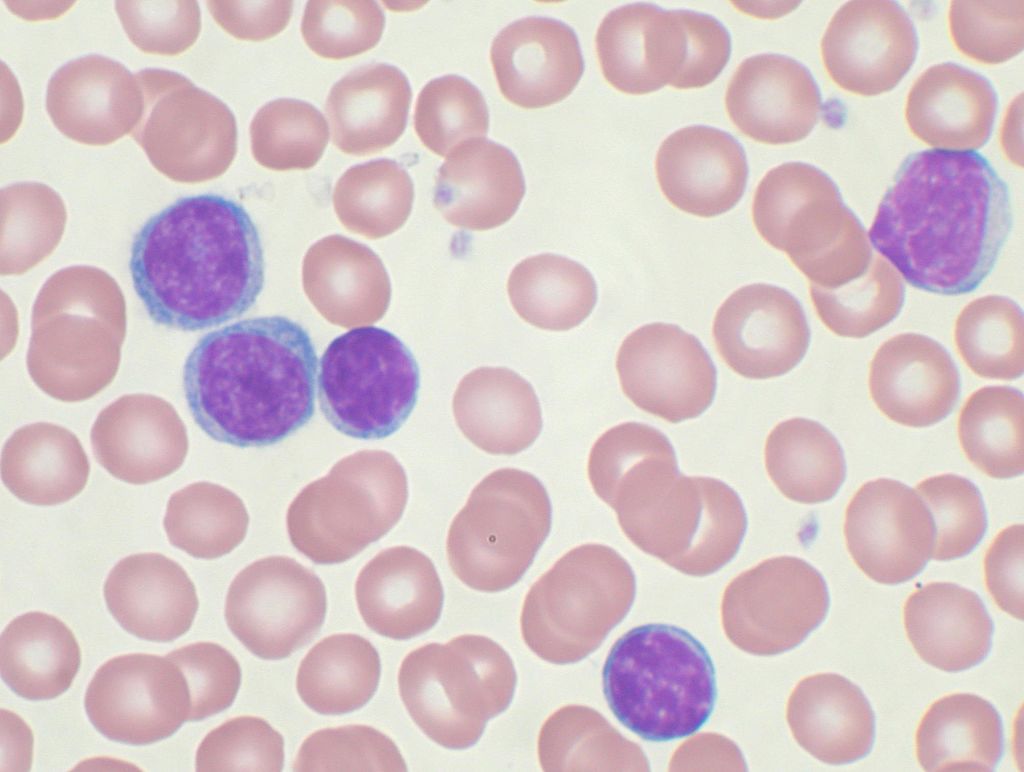The FDA has approved the first non-chemotherapy combination treatment for the most common form of leukemia in adults, a one-two punch of Pharmacyclics (AbbVie)/Janssen Biotech (Johnson & Johnson)’s Imbruvica® (ibrutinib) and Genentech, a member of the Roche Group’s Gazyva® (obinutuzumab).
The Imbruvica/Gazyva combination is now indicated for previously-untreated adult chronic lymphocytic leukemia/small lymphocytic lymphoma (CLL/SLL).
The FDA approval was based on results from the Phase III iLLUMINATE (PCYC-1130) trial (NCT02264574), a 212-participant study that showed the combination of Imbruvica and Gazyva significantly improved progression-free survival (PFS) compared to Gazyva plus the chemo treatment chlorambucil in previously untreated CLL/SLL patients who were 65 years or older, or less than 65 years old with coexisting conditions.
According to data presented at the 2018 American Society of Hematology (ASH) Annual Meeting and simultaneously published in The Lancet Oncology, at a median follow-up of 31 months, patients treated in the Imbruvica arm saw a 77% reduction in risk of progression or death compared to Gazyva-plus-chlorambucil arm, and an 85% reduction in risk of progression or death compared to the Gazyva-chlorambucil combo when evaluating PFS in patients with high-risk disease (17p deletion/TP53 mutation, 11q deletion, or unmutated immunoglobulin variable region heavy chain or IGHV).
Overall response rate was 89% percent in the Imbruvica-Gazyva arm versus 73% in the chlorambucil-Gazyva arm, Janssen noted in a separate statement.
“This latest Imbruvica FDA approval gives the healthcare community the first chemotherapy-free, anti-CD20 combination to treat CLL and SLL patients who have not yet started therapy. Also, and importantly, this new treatment combination helps reduce the need for chemotherapy,” said Carol Moreno, MD, PhD, consultant hematologist, Hospital de la Santa Creu Sant Pau, Autonomous University of Barcelona, Barcelona, Spain, and lead investigator of the iLLUMINATE study.
Imbruvica is an oral, once-daily, first-in-class Bruton’s tyrosine kinase (BTK) inhibitor that is FDA-approved in CLL, SLL, and four other diseases: CL Waldenström’s macroglobulinemia (WM), along with previously-treated mantle cell lymphoma (MCL), previously-treated marginal zone lymphoma (MZL), and previously-treated chronic graft-versus-host disease (cGVHD). Imbruvica’s first approval came in November 2013, for adults with MCL who have received at least one prior therapy.
“This milestone represents our continued commitment to develop Imbruvica-based, non-chemotherapy regimens to address the clinical needs of patients living with CLL/SLL,” stated Craig Tendler, MD, VP, clinical development and global medical affairs, Janssen Research & Development.
Imbruvica had previously been approved in the same indication both as monotherapy and in combination with the Genentech/Biogen co-marketed Rituxan® (rituximab), also sold as MabThera®, and the chemo treatment bendamustine. For the monotherapy indication, the FDA also updated the Imbruvica label to include additional long-term efficacy follow-up supporting its use as a single agent in CLL/SLL from the Phase III RESONATETM (PCYC-1112; NCT01578707) and RESONATETM-2 (PCYC-1115, NCT01722487; and PCYC-1116, NCT01724346) trials.
In 2018, Imbruvica generated more than $6.2 billion in sales—$3.59 billion reported by AbbVie, up 39.5% from a year earlier, and $2.615 billion by Janssen parent Johnson & Johnson, up 38% from 2017.
First approved in 1997, Rituxan generates far more in sales for Roche than Gazyva, which was first approved in November 2017. For the first nine months of 2018, Rituxan racked up CHF 5.110 billion ($5.155 billion) versus CHF 281 million ($283.5 million) for Gazyva. However, on November 28, the FDA approved the first biosimilar to Rituxan, Celltrion’s Truxima (rituximab-abbs), creating an additional incentive for Roche to maximize sales for Gazyva through additional indications.
Gazyva®/Gazyvaro® is a CD20-directed cytolytic antibody indicated in combination with chlorambucil for patients with previously-untreated CLL; in combination with bendamustine followed by the drug for patients with follicular lymphoma who relapsed after, or are refractory to, a rituximab-containing regimen; and in combination with chemo followed by the drug alone in adults with previously untreated stage II bulky, III, or IV follicular lymphoma.
Added Danelle James, MD, head of clinical science, Pharmacyclics, “We are living in a time of significant advances in cancer treatment, particularly in blood cancers, and this latest Imbruvica FDA approval is an example. I am proud that we can now give physicians and patients a new option to treat CLL and SLL without the need for chemotherapy.”


